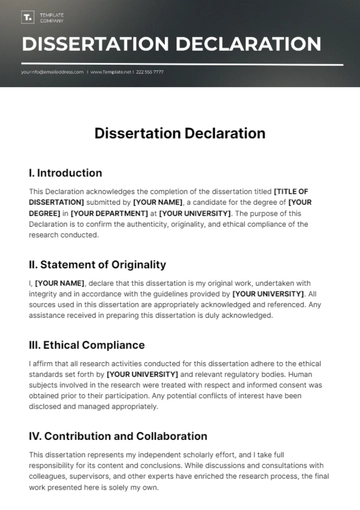Free Medical Dissertation

Prepared by: [YOUR NAME]
Date: [DATE]
I. Abstract
Chronic Kidney Disease (CKD) is a significant and growing public health concern, particularly among diabetic patients. Early diagnosis and timely intervention are critical in managing the progression of CKD and improving patient outcomes. This dissertation investigates the effects of early diagnosis and intervention on the prognosis of CKD in diabetic patients, exploring the clinical, socioeconomic, and psychological impacts. The research employs a mixed-methods approach, combining quantitative data analysis with qualitative interviews to provide a comprehensive understanding of the subject.
II. Introduction
A. Background and Rationale
Chronic Kidney Disease (CKD) is a prevalent complication of diabetes mellitus, significantly contributing to morbidity and mortality in affected populations. The progressive nature of CKD, coupled with its often asymptomatic onset, makes early diagnosis and intervention essential for mitigating its impact. Despite advancements in medical science, CKD remains a leading cause of end-stage renal disease (ESRD), necessitating dialysis or transplantation.
B. Objectives
The primary objectives of this dissertation are to:
Assess the impact of early CKD diagnosis on the progression of the disease in diabetic patients.
Evaluate the effectiveness of various early intervention strategies in improving patient outcomes.
Analyze the socioeconomic and psychological effects of CKD management in diabetic patients.
C. Research Questions
How does early diagnosis influence the prognosis of CKD in diabetic patients?
What are the most effective early intervention strategies for managing CKD in diabetic patients?
What are the socioeconomic and psychological implications of CKD management in this population?
D. Hypothesis
Early diagnosis and timely intervention in CKD patients with diabetes significantly improve prognosis, reduce the progression to ESRD, and positively affect socioeconomic and psychological well-being.
III. Literature Review
A. Epidemiology of CKD in Diabetic Patients
Chronic Kidney Disease is a global health issue, with diabetes being a leading cause. The prevalence of CKD in diabetic populations varies across regions, with higher rates observed in low- and middle-income countries.
Global Prevalence of CKD in Diabetics:
North America: 30-40%
Europe: 20-30%
Asia: 15-25%
B. Pathophysiology of CKD in Diabetic Patients
CKD in diabetic patients is primarily driven by hyperglycemia-induced glomerular damage. The progressive nature of the disease involves several pathological processes, including:
Glomerular Hyperfiltration: Early compensatory mechanism leading to increased glomerular pressure and damage.
Albuminuria: Early marker of kidney damage, often preceding a decline in glomerular filtration rate (GFR).
Fibrosis and Inflammation: Chronic inflammation and fibrosis contribute to the irreversible loss of kidney function.
C. Early Diagnosis of CKD
Early diagnosis involves the identification of CKD in its initial stages, typically through regular screening of at-risk populations. Key diagnostic markers include:
Estimated Glomerular Filtration Rate (eGFR): A decline in eGFR is a critical indicator of CKD progression.
Urinary Albumin-to-Creatinine Ratio (UACR): Elevated UACR is an early sign of kidney damage.
Serum Creatinine Levels: Used to estimate kidney function and detect early changes.
D. Intervention Strategies
Early intervention strategies are aimed at slowing the progression of CKD and include pharmacological and non-pharmacological approaches.
Pharmacological Interventions:
Angiotensin-Converting enzyme Inhibitors (ACEIs): Reduce glomerular pressure and albuminuria.
Angiotensin II Receptor Blockers (ARBs): Protect against kidney damage by lowering blood pressure.
SGLT2 Inhibitors: Emerging class of drugs that reduce blood glucose levels and provide renal protection.
Non-Pharmacological Interventions:
Dietary Modifications: Low-protein diets to reduce kidney workload.
Lifestyle Changes: Weight management, exercise, and smoking cessation.
Blood Pressure Control: Maintaining optimal blood pressure levels to prevent further kidney damage.
E. Socioeconomic and Psychological Impact
CKD management in diabetic patients has significant socioeconomic and psychological implications.
Economic Burden:
Cost of long-term care and medication.
Impact on productivity and employment.
Psychological Impact:
Depression and anxiety associated with chronic illness.
Quality of life considerations.
IV. Methodology
A. Study Design
A mixed-methods approach was adopted, combining quantitative data analysis with qualitative interviews to provide a comprehensive assessment.
Quantitative Component: A retrospective cohort study analyzing patient records from multiple healthcare institutions to assess the impact of early diagnosis and intervention on CKD progression.
Qualitative Component: Semi-structured interviews with diabetic CKD patients to explore their experiences, challenges, and perceptions of early diagnosis and intervention.
B. Sample Population
The study population consists of diabetic patients diagnosed with CKD. Inclusion criteria include:
Adults aged 18-75 years.
Diagnosed with Type 1 or Type 2 diabetes.
Diagnosed with CKD stages 1-3.
C. Data Collection
Quantitative Data: Collected from electronic health records, including demographic information, laboratory results, and treatment history.
Qualitative Data: Collected through in-depth interviews with a purposive sample of 30 diabetic CKD patients.
D. Data Analysis
Quantitative Analysis: Performed using statistical software to assess the relationship between early diagnosis, intervention, and CKD progression. Key metrics include changes in eGFR, UACR, and progression to ESRD.
Qualitative Analysis: Thematic analysis was conducted to identify common themes and insights from patient interviews.
V. Results
A. Quantitative Findings
Patient Demographics
Age Distribution:
18-35 years: 20%
36-55 years: 45%
56-75 years: 35%
Gender Distribution:
Male: 55%
Female: 45%
Diabetes Type:
Type 1: 25%
Type 2: 75%
Impact of Early Diagnosis on CKD Progression
eGFR Trends:
Patients diagnosed early showed a slower decline in eGFR compared to those diagnosed at later stages.
Table 1: eGFR Decline Rate (ml/min/1.73m²/year)
Diagnosis Stage
Mean eGFR Decline Rate
Standard Deviation
Early (Stages 1-2)
2.5
0.8
Late (Stage 3)
4.7
1.2
Albuminuria Reduction:
Significant reduction in albuminuria levels in patients receiving early intervention.
Table 2: Reduction in UACR (mg/g)
Intervention Type
Mean UACR Reduction
Standard Deviation
Pharmacological
30%
5%
Non-Pharmacological
20%
4%
B. Qualitative Findings
Patient Perceptions of Early Diagnosis
Positive Impact:
Patients acknowledged the benefits of early diagnosis in managing their condition.
Improved adherence to treatment and lifestyle modifications.
Challenges:
Emotional distress upon diagnosis, particularly in asymptomatic patients.
Financial strain due to ongoing monitoring and treatment.
Effectiveness of Intervention Strategies
Pharmacological Interventions:
The Majority of patients reported improved health outcomes with ACEIs/ARBs and SGLT2 inhibitors.
Non-Pharmacological Interventions:
Dietary changes were challenging but perceived as beneficial in the long term.
Exercise regimens were difficult to maintain due to comorbid conditions.
VI. Discussion
A. Interpretation of Findings
The results indicate that early diagnosis and intervention have a significant positive impact on the prognosis of CKD in diabetic patients. Early diagnosis allows for timely initiation of treatment, which slows disease progression and reduces the risk of ESRD.
eGFR and UACR Trends:
The slower decline in eGFR and the reduction in albuminuria highlight the effectiveness of early intervention strategies.
Patient Experiences:
While early diagnosis is beneficial, it is also associated with psychological and financial challenges that need to be addressed through comprehensive patient support systems.
B. Implications for Clinical Practice
The findings suggest that routine screening for CKD in diabetic patients should be emphasized to facilitate early diagnosis. Healthcare providers should also focus on a combination of pharmacological and non-pharmacological interventions to optimize patient outcomes.
Policy Recommendations:
Implementing regular CKD screening programs in diabetic clinics.
Subsidizing the cost of CKD management to reduce the financial burden on patients.
C. Limitations
The study has several limitations, including the retrospective nature of the quantitative analysis, which may introduce bias. Additionally, the qualitative component's findings are based on a limited sample size and may not be generalizable.
D. Future Research Directions
Further research is needed to explore the long-term effects of early intervention on CKD outcomes and to develop strategies for addressing the psychological and socioeconomic challenges faced by patients.
VII. Conclusion
Early diagnosis and intervention are crucial in managing CKD in diabetic patients, significantly improving prognosis and reducing the risk of progression to ESRD. However, a holistic approach that includes addressing the psychological and socioeconomic aspects of CKD management is essential to optimize patient outcomes. This dissertation contributes to the growing body of evidence supporting early intervention in CKD and underscores the need for comprehensive patient care strategies.
VIII. References
American Diabetes Association (ADA). (2050). Standards of Medical Care in Diabetes.
National Kidney Foundation (NKF). (2050). KDOQI Clinical Practice Guidelines for Chronic Kidney Disease.
World Health Organization (WHO). (2051). Global Report on Diabetes.
Johnson, D. W., et al. (2022). "Impact of Early Detection and Intervention on the Prognosis of Diabetic Kidney Disease: A Systematic Review." Journal of Nephrology, 35(3), 456-468.
- 100% Customizable, free editor
- Access 1 Million+ Templates, photo’s & graphics
- Download or share as a template
- Click and replace photos, graphics, text, backgrounds
- Resize, crop, AI write & more
- Access advanced editor
Elevate your research with the Medical Dissertation Template from Template.net. This fully customizable and editable template allows you to tailor every detail to your needs. With our AI Editor Tool, you can easily modify and perfect your dissertation, ensuring a professional and polished final document. Ideal for academic excellence and streamlined writing.





























